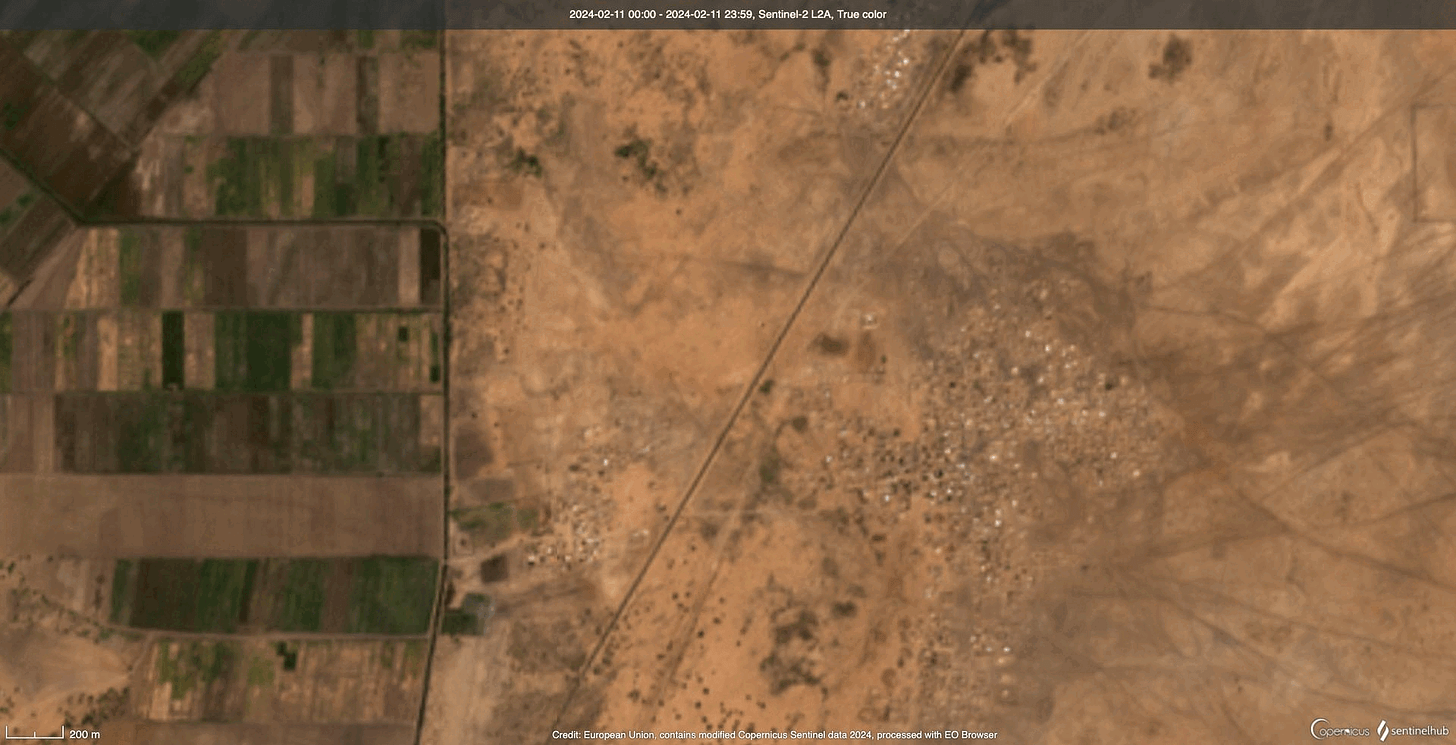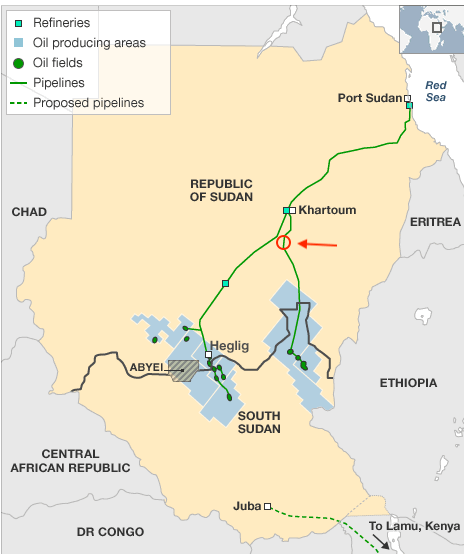'Major rupture' in Sudan oil pipeline
War-related spill threatens pocketbook of Sudan's southern neighbor
A major rupture has occurred in a pipeline that carries crude oil from South Sudan through Sudanese territory to Port Sudan, prompting the Sudanese oil minister to inform Chinese and Malaysian production partners that Sudan cannot meet its obligations to deliver crude oil through the pipeline system.
The rupture occurred due to a clog in an underground pipeline in territory controlled by the Rapid Support Forces (RSF) in northern White Nile State, at a village about 20 km south of the town of al-Giteina, near the frontline with the Sudan Armed Forces.
Due to “military operations” in the area, pump stations operated by the state-owned Bashayer Pipeline Company (BAPCO) ran out of diesel, causing a “gelling incident”—a clog, in other words—that led to a “major rupture,” according to a letter dated March 16 by Sudan’s Minister of Energy and Petroleum, Mohieldin Naim Mohamed Said.
Pipeline engineers accessed the area to contain the situation, but repairs have been delayed by the security situation, the minister added. “Teams were mobilized to the area for repair of the rupture and only managed to commence repairs after security clearance was obtained.”
Telecommunications outages in the area have complicated the efforts. Moreover, restarting the system requires the pump stations to have fuel, which is apparently still not the case.
Last month, RSF published a video of engineers visiting Pump Station 3 (below), which is near the rupture site, though they didn’t provide any details about the reason for the visit. They apparently had crossed the frontline to reach this area.
Sudan’s oil minister informed the production companies, “The resolution of these issues is challenged by the current war conditions in Sudan. As such, GoS [the Government of Sudan] is declaring a force majeure which disables us from meeting our obligations in delivering crude oil” through the pipeline to Port Sudan.
The failure to maintain and repair the pipeline happened in spite of efforts by both warring parties—the Sudanese army and the RSF—to maintain good relations with the Chinese and Malaysian state firms that control oil production in the two Sudans.
If it cannot be repaired, the rupture threatens a key source of revenue for governments of both countries, particularly for South Sudan, which has failed to develop alternative revenue sources since its independence from Sudan in 2011.
The incident began February 10, but was not made public, except that South Sudanese government officials held a press conference February 27 in which they made vague but alarming statements about an unspecified oil cutoff. Additionally, S&P Global Commodity Insights reported that oil tankers due for loading in Port Sudan in late February were unable to do so, and the last loading was February 15.
“Without immediate intervention, this situation could spell the end for the South Sudanese government,” South Sudan’s Minister of Information said at a press conference February 27. “Oil revenue is our primary source of income…”
A key security concern is that without oil money, South Sudan will eventually be unable to pay its security forces, which could trigger instability in the country.
However, the rupture only affects flows on one of two branches of the pipeline system, namely, the Petrodar Pipeline, which brings oil from Upper Nile in South Sudan. It’s unclear so far if flows from oilfields in Unity State in South Sudan (near Heglig on the map below) will be affected.
Sudan collects transit fees on oil flows from South Sudan, and produces some of its own oil. But oil is proportionally more important for South Sudan’s economy, due to a lack of other exports. Oil production has caused major environmental impacts in both countries, due to unsafe production practices.
Even if the pipeline can be repaired, the oil industry in the two countries face other existential threats, including Houthi attacks on shipping in the Red Sea, and a lack of interest by companies to invest in the sector, given the risk of a cut-off at any time.
Nighttime air raids in North Darfur
Bombings were reported in several areas of North Darfur last night, including Kabkabiya, Zurug, and El Fasher. Anti-aircraft fire was seen in El Fasher. There was no information yet about damage or casualties.
RSF counter-attack in Omdurman
The Rapid Support Forces are seeking to halt the SAF offensive in Omdurman, which has gained ground for three months, culminating in a major breakthrough last week. RSF yesterday counter-attacked and reached very close to the Wad al-Bashir Bridge (seen at 0:22 in the video below), which the army had captured on March 14.
Following the breakdown of RSF’s established frontlines in Omdurman, the situation in the city is now more fluid, with more back-and-forth fighting across wider territory than before. In general, SAF have pushed the front farther west, toward Ombada.
Fighting has also continued in Bahri in the Khatmiyya neighborhood near Signal Corps.
Military buildup on Kordofan border
The Sudanese army is building up a large force in the border area between White Nile State and the Kordofan region, with military aviation providing reconnaissance and air cover for a potential advance of these forces into North and South Kordofan.
Field sources reported that nowadays a large number of infantry forces of the Sudanese army are stationed in the Wad Ashana border area between the states of North Kordofan and White Nile—an area raided by the RSF in October. The same sources reported that three Antonov aircraft and four other reconnaissance aircraft are operating in conjunction with the forces, and have bombed various areas.
The Rapid Support Forces control large parts of the three Kordofan states, particularly North and West Kordofan, while the army still have garrisons in a few cities, the largest ones in El Obeid, Babanusa, and Kadugli.
The latest buildup of troops along the Kordofan border could signal an attempt to reinforce or resupply one or more of these garrisons, or to seize portions of key roads along which the RSF have established checkpoints.
In brief
An explosion of remnants of war (UXO) in Dilling in South Kordofan killed five children and wounded two others, Radio Dabanga reported Friday. The victims were war-displaced children who were staying at the Al-Humira Primary School for Girls. The hosptial in the city lacks surgical supplies for life-saving surgeries in such cases, according to the Medical Director of Dilling Teaching Hospital.
An Antonov-26 military cargo aircraft crashed in Yida, a border area between Sudan and South Sudan near the SPLM-N-controlled Nuba Mountains of Sudan. The aircraft belonged to the South Sudanese military.
Sudanese comedian Warrag Omar has adapted to life as a refugee by selling pastries in the Ethiopian capital Addis Ababa, according to a feature report published by Radio Dabanga.
CNN’s Nima Elbagir produced a report on mass recruitment by the RSF in Al Jazira State. “The RSF is weaponizing hunger—denying food to those who won’t join,” she says. The breadbasket state is undergoing a collapse in food production following its occupation by the RSF in December last year.



